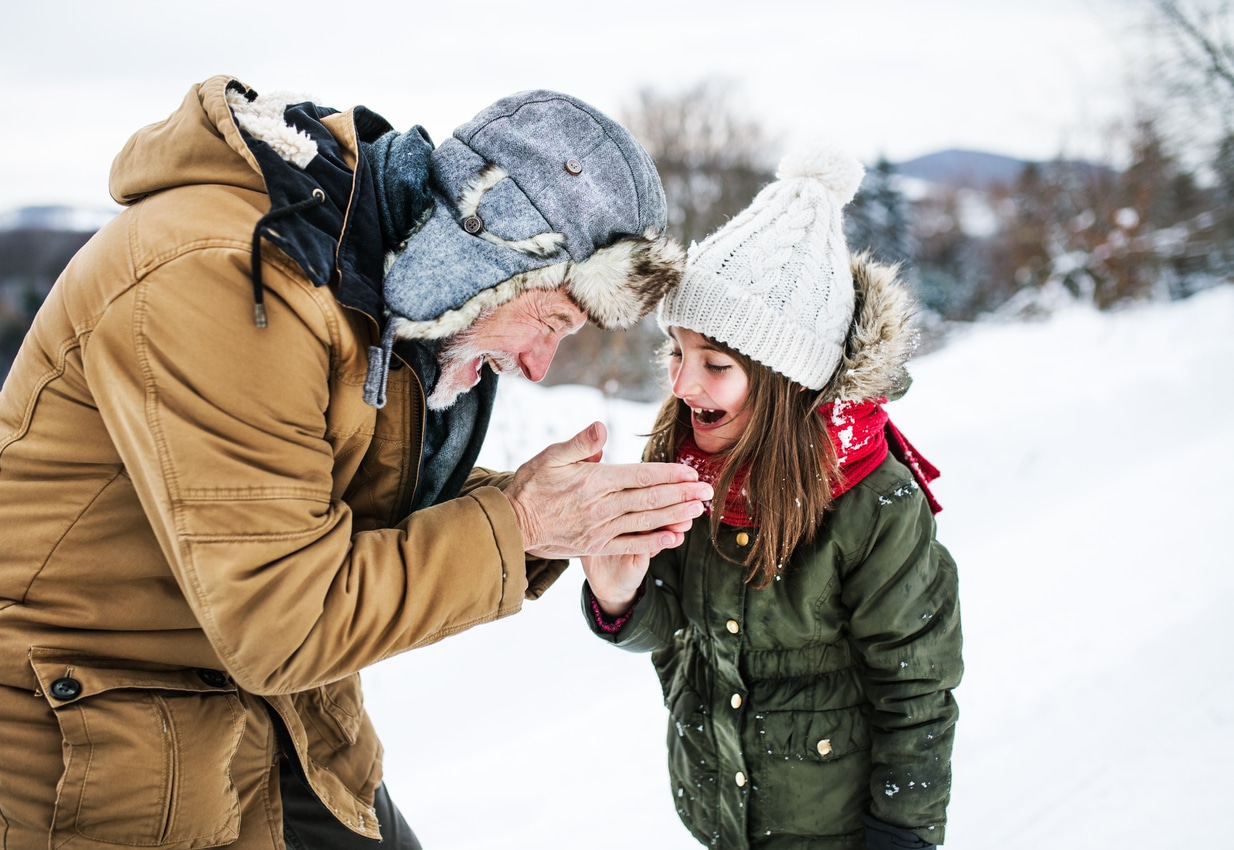Staying warm in the winter seems like good common sense, but it’s not always easy – especially as we age.
“As we age, we’re more sensitive to cold weather and we feel cold more easily,” explains Dr. Eugene Emmer, MD, a physiology Ph.D. and founder of RehaDesign Wheelchair Accessories. He ought to know. He comes from Lithuania, which he calls “a cold little country in Northern Europe”. “We not only feel colder, we are colder. For example, on average a woman’s mean body temperature decreases from 97.7 F in her twenties to 97.3 F in her sixties.”
Tips For Overcoming Physiology and Staying Warm This Winter
1. Keep the heat in
“You may be surprised at how a few small changes can make all the difference in your home,” says Peter Ross, CEO of Senior Helpers in Towson, MD. Check your heating system, fireplaces, and window and door seals for leaks and drafts. Your local power company may offer free home energy audits, and may also provide financial assistance for winterizing seniors’ homes. Check with your electric or gas utility or your county council on aging for resources. You can also put up heavy curtains to insulate large windows and glass doors. “Draping tapestries and other woven fabric over windows and walls is one of the ways castles were kept warmer in past times,” explains Austin, TX artist and designer Pablo Solomon, “and the Sioux and other Native American tribes survived sub-zero temperatures by layering their teepees.”
2. Get moving
“Movement is one of the main ways our bodies generate heat,” says Emmer. “Low-mobility seniors obviously generate less heat and will have to do more to retain the heat that their bodies generate. In addition, many low-mobility seniors will have other medical issues, such as diabetes, cardiovascular disease, etc., which can also cause them to regulate body temperature less efficiently.” Talk to your doctor about your capacity for safe physical activity and what you can do to move your way to warmth.
3. Bundle up
Dressing warmly helps you avoid the cold in your home and on the go. “When outside, seniors should wear layers, a button-up sweater — easier to pull on than a pullover — good-quality boots with removable insoles to allow for faster drying, and a warm hat,” says Rick Lauber, a former caregiver for both of his aging parents, and author of The Successful Caregiver’s Guide. Layering works indoors, too, making it easier to regulate your temperature. Keep a throw blanket or shawl nearby for added coziness.
4. Take advantage of sunlight
Even on the coldest days, the sun can warm you up and raise your spirits. Get outside if you can or sit by a window. “Utilize the warmth of the sun coming in your windows,” Solomon suggests. “Allow the sun to shine in.”
5. Create heat
There are lots of products on the market that help you stay warm, such as heated mattress pads, massagers with heat controls, and good old heating pads. These items are useful, but must be used with care. Our skin becomes thinner when we age and can be more susceptible to burns. Don’t use these devices for long periods and remember to turn them off when not in use.
What you definitely don’t want to do is increase the risk of fires and burns. Here’s some advice for keeping warm and safe from the North Carolina Jaycee Burn Center in Chapel Hill:
- Never use your stove or oven to heat your home.
- Install and maintain smoke and carbon monoxide alarms.
- If you smell gas, leave the house immediately and call the fire department or gas company.
- Do not light an appliance if you smell gas.
- Choose a space heater approved by a testing authority like Underwriters Laboratory or Factory Mutual.
- Have your furnace and chimney cleaned and inspected by a qualified professional; and get an electrician to verify that your home’s wiring can handle the electrical pull that small heaters often require.
- Properly ventilate rooms where kerosene heaters are in use by opening a window one-half to one-inch wide to create air circulation and avoid carbon monoxide buildup.
- Keep a charged ABC-rated fire extinguisher on each floor of your home.
- Use this advice to keep the cold at bay during the winter months.
Don’t disregard professional medical advice, or delay seeking it, because of what you read here. This information is not intended as a substitute for professional consultation, diagnosis or treatment; it is provided “as is” without any representations or warranties, express or implied. Always consult a healthcare provider if you have specific questions about any medical matter, and seek professional attention immediately if you think you or someone in your care may be suffering from a healthcare condition.




